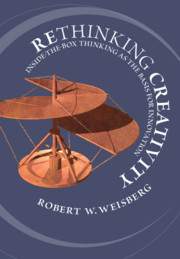Book contents
- Rethinking Creativity
- Rethinking Creativity
- Copyright page
- Dedication
- Contents
- Figures
- Tables
- Part I Introduction
- Part II Analytic Thinking in Creativity
- Part III The Question of Extraordinary Thought Processes in Creativity
- 6 How Do You Get to Carnegie Hall? Practice, Talent, and Creativity
- 7 Insight in Problem-Solving and Creative Thinking
- 8 The Question of Unconscious Processes in Creative Thinking
- 9 Genius and Madness
- Part IV The Psychometrics of Creativity
- Part V The Neuroscience of Creativity
- References
- Index
6 - How Do You Get to Carnegie Hall? Practice, Talent, and Creativity
from Part III - The Question of Extraordinary Thought Processes in Creativity
Published online by Cambridge University Press: 01 October 2020
- Rethinking Creativity
- Rethinking Creativity
- Copyright page
- Dedication
- Contents
- Figures
- Tables
- Part I Introduction
- Part II Analytic Thinking in Creativity
- Part III The Question of Extraordinary Thought Processes in Creativity
- 6 How Do You Get to Carnegie Hall? Practice, Talent, and Creativity
- 7 Insight in Problem-Solving and Creative Thinking
- 8 The Question of Unconscious Processes in Creative Thinking
- 9 Genius and Madness
- Part IV The Psychometrics of Creativity
- Part V The Neuroscience of Creativity
- References
- Index
Summary
This chapter examines the question of whether world-class achievement – in other words, genius – is the result of talent or practice. Is the genius born or made? The chapter begins with a case study of creative development at the genius level – The Beatles – which presents the questions that can be raised concerning the role of talent versus practice in creative achievement at the highest level. Some researchers have proposed that all accomplishment is based solely on practice and that talent plays no role. In response to that strong practice view, supporters of the notion of talent have presented evidence that high achievement requires more than practice. The chapter reviews both sides of that debate. A number of researchers have proposed that the question of whether genius is born or made is not the correct question. One should study how people’s inherited characteristics and their experiences work together to produce world-class achievement. The critical question is not whether the genius is born or made but rather how one’s inherited characteristics interact with one’s experiences to result in the production of novel works. That is, geniuses are born and made.
- Type
- Chapter
- Information
- Rethinking CreativityInside-the-Box Thinking as the Basis for Innovation, pp. 183 - 214Publisher: Cambridge University PressPrint publication year: 2020

